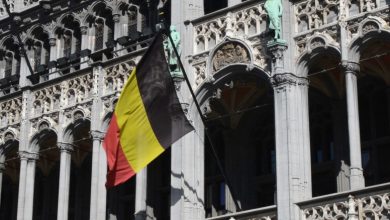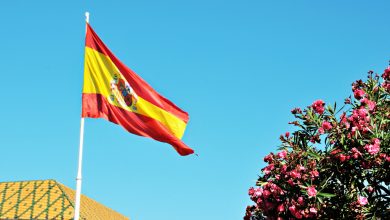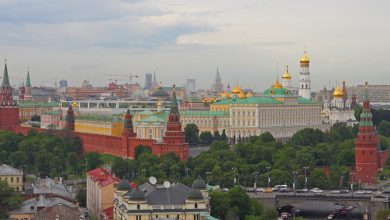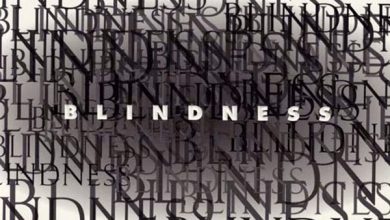Eurovision is Finally Back!

The month of May has arrived, and as flowers blossom around the continent, so do the Eurovision fans. For the first time since its creation in 1956, the 2020 Eurovision edition was cancelled due to COVID-19 lockdowns. The Dutch authorities have however confirmed that the 2021 edition will indeed take place as planned, causing jubilation for its fans and despair for its haters.
Between the 18th and the 22nd of May 2021, 39 countries will take part in the Eurovision Song Contest in Rotterdam. The national juries and the public will decide which song is the best – or at least, which song they prefer.
What is Eurovision Exactly?
At the risk of causing confusion, there are two different meanings for Eurovision. What we are talking about here is the Eurovision Song Contest. The annual competition is organised by a TV network also called Eurovision, which is part of the European Broadcasting Union (EBU), an alliance of public service media organisations around Europe and beyond.
Any member of the EBU can participate in the Eurovision Song Contest. This explains why Israel, Morocco and Turkey have participated at least once. It also means that countries like Egypt or Tunisia are eligible to participate if they want to as they are full members of the EBU, but Liechtenstein cannot. The case of Australia is more special, as in theory they only have “EBU Associated Member” status, but in practice they have participated to Eurovision assiduously since 2015. The explanation is simple: they had an enormous audience, asked politely to join, and were accepted as guests that have come back every year since then.
With almost 200 million people watching it every year, Eurovision is a formidable stage for artists to reach a bigger audience both at home and internationally. This is the very same show that made Abba and Céline Dion famous worldwide, fuelling the dreams of renown to the participants.

Eurovision’s Identity
For many people that don’t really follow the song contest, Eurovision is merely a show of bad pop songs where only Eastern European countries win. This statement is partly true. Yes, there are a lot of pop songs, and yes, some Eastern European countries such as Moldova have a habit of sending entries that fit the Eurovision stereotype to a tee (see for references when they created the Epic Sax Guy meme).
The show is known, in fact, for making fun of itself in this regard. Think, for example, of the unforgettable Verka Serduchka, the Ukrainian comedian who makes regular appearances to entertain the audience with his iconic star-shaped disco hat. Or again, when presenters themselves described the recipe for a perfect Eurovision performance (which should include love, peace, memorable costumes and some strange old folkloristic instrument) when introducing the song “Love Love Peace Peace” in Stockholm back in 2016.
But the audience also loves powerful songs that do not necessarily have this ironic taint to them. 2016, 2017 and 2019 winners were far from being silly pop songs. Both moods go hand in hand, and this makes the beauty – and the identity – of the show. The stage can display a silly pop, a heart-breaking ballad, and a headbanging hard rock piece – that’s part of the fan appeal!
The Confusion over its Political Dimension
Technically, the contest is supposed to be neutral in terms of politics, and political statements are forbidden. Georgia was refused participation in 2009 with the title “We Don’t Wanna Put In” which was a barely hidden criticism of the President of Russia. Belarus was disqualified from this year’s edition for sending a pro-Lukashenko song allegedly mocking the protests and named “Ya nauchu tebya (I’ll teach you)”.
On the other hand, the stage is often used for societal messages, to favour equality, LGBTQ+ friendly messages, etc. The 2018 winning song, by Netta, had a strong anti-patriarchy message, for example. Austria won in 2014 with Conchita Wurst’s song, “Rise Like a Phoenix”, promoting acceptance for and giving a voice to the LGBTQ+ community. Since its first openly gay contestant in 1997, Páll Óskar Hjálmtýsson from Iceland, the show has made a sort of “coming out” by itself by defending values of tolerance, giving the spotlight and a chance to shine to these messages.
The Power of Music
Like clockwork, Eurovision always brings up arguments about how these societal messages are political after all, and that they shouldn’t have any space within a song contest. But has music ever been neutral? Music has been used to fight oppressive regimes, like “E depois do adeus” by Paulo de Carvalho, which was the secret sign to the military to start the Carnation Revolution against the Salazar regime in Portugal. Music is also used to express a feeling in society; things we love or things we hate.
If a song like “Rise like a Phoenix” won, it means that it resonated in people’s hearts and that it deserved to win. It is a mere reflection of society and if songs about love or dancing are popular, they are certainly not the only ones to exist. A song speaks to the heart, to the emotions.
By allowing the public to vote, it opens the door to societal messages that vibrate within the crowd. If we only wanted to have the best song in purely technical terms, the jury would be the sole judge. The current system is a good balance between technical skills and popular votes, which are based only on the heart. Without that, the show would be significantly less entertaining.

The European Soul of Eurovision
The Eurovision Song Contest is also a stage for European identity. People from across the continent gather on stage, in the stadiums, in bars (during normal times), and celebrate music. Europeans come together on a stage, perform and cheer on each other. Many of them choose to proudly display their culture and their language and everyone applauds.
This is a place where being chauvinistic is not a thing, because music is such an emotional and subjective feeling. It often leads to mitigated feelings or disappointment over one’s own country when the music does not fit his or her personal taste. Eurovision is about picking the country with the song you like the most and rooting for them, regardless of the country itself.
The show focuses on having fun and there are no borders. Cultures, languages, and accents cohabitate, and this does not seem to be a problem. We are united in diversity.
The show took a deeper European turn when the Berlin Wall fell. The countries recently freed from the USSR’s yoke had a strong desire to be recognised as European. Estonia openly stated that their path to the European Communities went through Eurovision as well. This cultural aspect seems to be taken seriously by most Eastern European countries, which often have strong contenders to the show. It may also explain why Ukraine never lost a semi-final since its first participation in 2003, and even won twice, the first time being only one year after their entry in the contest.
Of course, while the show has a very European identity, there is no direct correlation between it and European cooperation on a political level. After all, it did not prevent Brexit, and Switzerland, where the first edition took place, never had a sudden urge to join the European institutions family.
However, the show does create the possibility to be a part of Europe without the politics, without having to debate on rules, on trade, and all the nitty-gritty that comes with politics. It allows to be a part of Europe, as diverse and vast as it is, and to have fun with friends from all over the continent. If this does not convince you, then nothing will.





